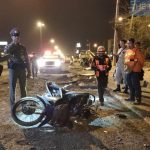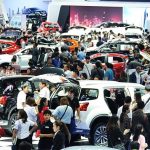For more than three months, facial masks have become a necessity for Thais, though not all the people find this accessory affordable or easy to obtain because at times there are shortages.
The reasons for using masks have changed over the past months. From November to early February, people needed the accessory to protect them from the ultrafine PM2.5 dust, which is now an annual occurrence. If the past dust situation serves as a guide, the pollution may last until early next month.
Now it’s fears over the novel coronavirus, or Covid-19, outbreak that are forcing people to put on the masks. An infection at Don Muang-based B.Care Hospital, involving an elderly couple who tested positive for the virus after a trip to Japan’s famous Hokkaido, and a young grandson, created panic. The fact that they lied about the trip and were in contact with so many unknowing people, medical crew that treated them, and the grandson’s classmates, for example, caused huge public anger. Though health authorities said the couple are not super spreaders — just yet — given that infections are still limited, their ignorance has put the country at risk of an epidemic.
Because of the virus threat, there will be a need for masks for quite some time until the authorities find a way to effectively and efficiently contain the disease.
A recent opinion poll showed that Thais are more worried about the coronavirus outbreak than PM2.5 dust, largely because the number of fatalities and infections abroad rose in such a short time. Easy transmission is another fear factor. And, to a certain extent, many people have got used to the smog. The media attention is gone.
But in my opinion, we should not let the dust fears disappear so soon. On the contrary, we should remain alert and do whatever we can to force the authorities to continue the battle against the pollution, and avoid a flash-in-the-pan reaction.
To me, the virus may be an emergency, but PM2.5 dust is deadlier than the disease.
Let me explain.
The coronavirus may seem very scary, but I still believe it is a matter of choice for most of us. It’s safe to say it’s largely a matter of lifestyle if we want to stay healthy and safe from Covid-19. We can choose to avoid crowded places, markets or shopping malls, drop plans to visit those hotspots where outbreaks are reported; we can opt for safe practices, frequent hand washing with water or alcohol gel, mask wearing, and abandon unhealthy, bad habits, like touching one’s face with unwashed hands.
Quarantine should be strictly observed in suspected cases. Look at China, the virus epicentre — the situation there is getting better. On Wednesday, the World Health Organisation said that new case numbers and deaths are dwindling in Wuhan and Hubei province as a result of strict anti-infection measures. To be more exact, the daily coronavirus death toll in mainland China has fallen to its lowest in nearly a month. Thailand, too, can tackle the virus if we strictly follow health guidelines.
But we have to admit that we have virtually no control over PM2.5 dust.
Although some of us may choose to avoid the smog by working from home, the dust can penetrate our houses, our bedrooms. An air purifier may be helpful but how many can afford one? And staying indoors is not possible for a number of professions, like street cleaners, bus drivers, vendors.
A glance at the air quality chart this week showed a red alert for pollution for a few days, but few people complained as they seemed to be far more absorbed with Covid-19. In Bangkok, fewer people were wearing masks when outdoors. The situation is still bad in several provinces like Chiang Mai and Mae Hong Son, but no one seems to care. I spotted open burning while en route to Pak Chong last week. Isn’t that illegal?
Look at how the authorities still focus on passive measures. The BMA, for example, ordered school closures, construction suspension, and some checkpoints to remove smoke-belching vehicles from the roads. But I can still see those filthy vehicles around the city. BMTA buses are among them.
We blame the state a lot about the PM2.5 problem, but many of us still have that bad habit of keeping our car engines on when parked. This may sound trivial, but, as we know, there are too many cars in Bangkok. Such a practice is illegal, but I have never seen any action taken against those who breach the regulation.
If the authorities have long-term measures, a curb on construction projects, for instance, I have to say I am not convinced.
If we are lucky, the dust will go away in a week or two, when the weather conditions become more agreeable. But don’t be overjoyed. Smog will surely come back by November, as the authorities still seem to have a love affair with half-hearted measures.




